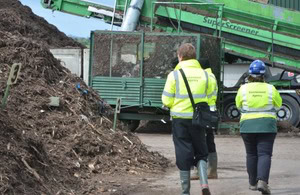At Leicester magistrates’ court on 12 December 2024, William David Clarke was found guilty on five charges. These were related to offences committed at Soars Lodge Farm, Foston Road, near Countesthorpe.
He received a nine-week period of imprisonment for each, suspended for a year. The court also imposed a remediation order to deal with the land contamination which had arisen. This was a result of processing green waste, and the spreading of contaminated compost.
The court heard that the defendant pleaded guilty at a previous hearing on 3 July 2024 to the offences which occurred between 26 April 2018 and 15 May 2020.
Officers from the Environment Agency were made aware of issues at the farm after nearby residents had complained about large quantities of litter. This resulted in an audit in April 2018 of the composting and land spreading operations, both of which were regulated by environmental permits.
The permits allowed the composting of green waste and untreated wood and the spreading of the resulting compost, providing it met quality standards. The site received green waste from kerbside collections from local councils and waste from household recycling centres. The site also accepted green waste from tree surgeons and gardening businesses.
‘Heavily contaminated’
However, the compost produced did not meet the specification to be spread on the farm’s fields as a fertiliser substitute. The material was being inadequately composted and was said to be heavily contaminated with plastics, metal, textiles, rubber and treated wood.
The court also heard that separated loose plastics were stored in such a way that they were allowed to escape across the surrounding countryside. Contaminated compost had been spread onto and ploughed into the farmland, and was also said to be stockpiled illegally in windrows outside the permitted site.
The defendant told the officers that he used an automated system to record deliveries of waste, because the waste reception area was only attended during less busy times.
The waste from the kerbside collections and from household waste recycling centres was contaminated with black bin bag waste, flower pots and other materials.
The EA found that Clarke was also accepting unauthorised waste types, namely treated wood, including wood coated in plastic, and wood treated with paint and preservatives.
An enforcement notice was served in 2019 requiring the defendant to stop accepting treated wood waste and to remove any treated wood already on site. Clarke failed to comply with that notice.
Clarke later applied for permission to spread the compost onto his fields. Although he had declared the stockpiles as free of any contamination, forensic analysis by the Environment Agency found that all 44 of the samples taken failed.
‘Lambs chewing waste textiles’
The court was told that litter pollution from the composting was so bad, that field boundaries, hedgerows and ditches looked like motorway verges. Environment Agency officers said they had witnessed lambs chewing fragments of waste textiles on one of the illegal compost stockpiles.
The EA applied to the court for a Remediation Order against the defendant. Following sentencing, the judge granted the Order, specifying that the clean-up must be completed by noon on 12 December 2027.
The farm is the subject of a planning application to Blaby district council for the development of a solar farm. The judge ordered that the Remediation Order must be completed before that development can take place.
Clarke denied running the site and blamed his father, David Clarke, who died during the investigation, and owned Soars Lodge Farm and was joint holder of both environmental permits with him. However, the judge disagreed and found that William Clarke was in day-to-day control of the composting operations.
‘Damage to wildlife’
Iain Regan, Environment Agency Senior Environmental Crime Officer, said: “We encourage the proper treatment and recycling of green waste where this has environmental benefits, such as by adding nutrients and improving soil structure. But where wastes which aren’t suitable are treated and spread, as in this case, this can cause pollution and damage to wildlife.
“We welcome these sentences which should act as a deterrent to others considering flouting the law. We also welcome the Remediation Order to try to put right the damage which William Clarke has caused to his own land and that adjoining his farm. The defendant ignored our concerns and refused to act on the extensive advice we gave him to improve his operation, and that has resulted in these convictions.”









Subscribe for free